US To Give Extra $67 Million To Lebanon's Army, Says Senior US Official
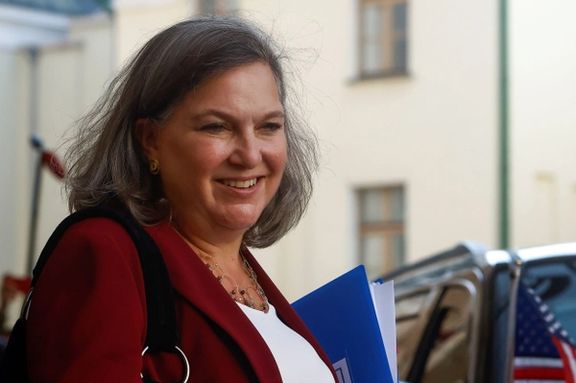
The United States will offer an additional $67 million to support the Lebanese army, US Under Secretary of State Victoria Nuland said in Beirut on Thursday.

The United States will offer an additional $67 million to support the Lebanese army, US Under Secretary of State Victoria Nuland said in Beirut on Thursday.
Speaking at a news conference, Nuland said the United States was working with the Lebanese authorities, alongside the World Bank and humanitarian relief agencies, to help the country amid its deep economic crisis.
She offered condolences from the United States to the nation after violence erupted in Beirut, resulting in at least six dead and several others wounded.
Authorities said the bloodshed was a result of gunfire on protesters who were going to take part in a demonstration called by Hezbollah, the Iran-backed Shi'ite group. Demonstrators had been gathering to demand the removal of the judge investigating last year's Beirut port blast.
Hezbollah and its Shi'ite ally, the Amal movement, accused the Christian Lebanese Forces party of being behind the shootings.
Lebanon has been facing a financial meltdown, leading to shortages of basic goods, including fuel. Amid the crisis, Iran has sent fuel to Lebanon.
Nuland said any support offered by oil producing Iran was a "publicity stunt".
Report by Reuters
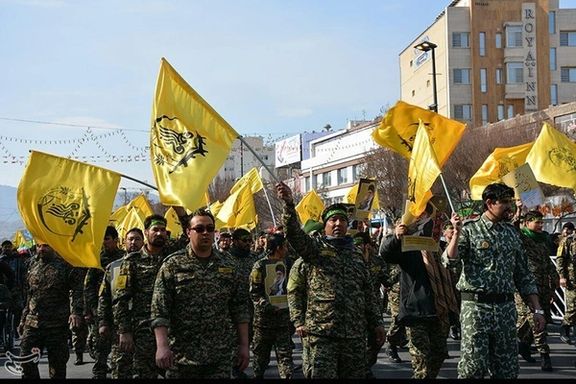
Iran-backed forces in Syria said on Thursday they would respond forcefully to an Israeli strike on Wednesday evening in the second such strike within a week.
The Syrian defense ministry said in a statement that one soldier was killed in the attack that took place at 11:34 p.m. (2034 GMT) and targeted a communications tower and caused some material losses near Palmyra.
Israel has kept silent about the strikes that came days after another attack in the Homs countryside, wounded six Syrian soldiers.
Israel since 2017 has been mounting attacks on what it has described as Iranian-linked targets in Syria, where Tehran-backed forces including Lebanon's Hezbollah have put down a presence since deploying to help President Bashar al-Assad in the Syrian conflict that erupted in 2011.
A statement by the so-called operations room of Assad's Iran-backed allies said the response to the strike would be "very cruel", adding casualties would have been much higher had its forces not been well spread across the desert area.
"As a result of this attack a number of martyrs and injured from our Mujahedeen brothers have fallen," the statement said without elaborating.
"We have taken a decision to respond to this attack in revenge for the martyrs and the blood of the injured and the response will be very cruel," said the statement.
A senior military source who requested anonymity said the strikes hit among other targets the T4 air base where Iran-backed militias launched drone strikes in recent months against US bases in northern Syria.
The Palmyra area where the strikes were conducted are close to a major concentration of Russian bases and where its troops conducted in recent days maneuvers with Syrian troops, military experts say.
Israel wants Iranian and Iran-backed forces kept away from its border and more broadly, removed from Syria entirely.
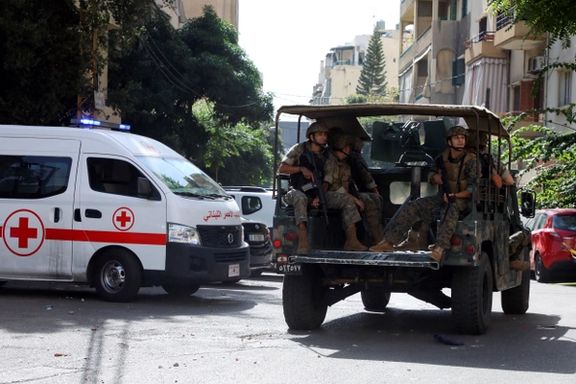
At least two people were killed in Beirut on Thursday when heavy gunfire targeted supporters of the Shi'ite group Hezbollah, as they headed to a protest demanding the removal of the judge investigating last year's explosion at the city's port.
The shooting on a frontline of the 1975-90 civil war marks some of Lebanon's worst civil strife in years, and highlights a deepening political crisis over the probe into the catastrophic Aug. 4, 2020 blast.
The Lebanese army said in a statement the gunfire had targeted protesters as they passed through a traffic circle located in an area dividing Christian and Shi'ite Muslim neighborhoods.
As Prime Minister Najib Mikati called for calm, a military source told Reuters two people had been killed and seven more wounded.
The shooting began from the Christian neighborhood of Ain el-Remmaneh before spiraling into an exchange of fire, the source added.
Hezbollah's al-Manar TV said "two martyrs" and a number of wounded had been taken to a hospital in the Shi'ite southern suburbs, indicating that the casualties were Shi'ites.
Bursts of gunfire were heard for several hours, along with several explosions which appeared to be rocket propelled-grenades fired into the air, Reuters witnesses said.
The Lebanese army deployed heavily in the area and said it would open fire against any armed person on the road.
Political tensions over the probe into the port explosion have been building, with the heavily armed, Iran-backed Hezbollah leading calls for Bitar's removal, accusing him of bias.
The explosion killed more than 200 people and devastated swathes of Beirut.
The judge has sought to question a number of senior politicians and security officials, including Hezbollah allies, suspected of negligence that led to the port explosion, which caused by a huge quantity of ammonium nitrate.
All have denied wrongdoing.
Though none of its members have been targeted by the probe, the heavily armed, Iran-backed Hezbollah has accused Bitar of conducting a politicized probe only focused on certain people.
These include some of its closest allies, among them senior figures in the Shi'ite Amal Movement who occupied ministerial posts.
A court earlier on Thursday dismissed a legal complaint against the Bitar, documents showed - allowing him to resume his investigation.
On Wednesday, Samir Geagea, a Christian opponent of Hezbollah, rejected what he described as any submission to "intimidation" by the group, calling on Lebanese to be ready for peaceful strike action if the "other side" tried to impose its will by force.
Reporting by Reuters
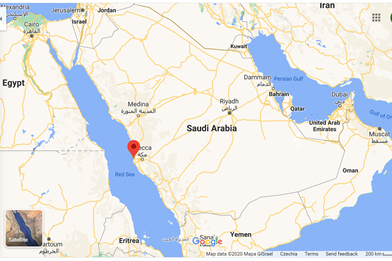
Saudi Arabia fighting the Houthis in Yemen has destroyed two explosive-laden boats used in an attempted attack by the Iran-aligned group in the Red Sea.
The Saudi State TV that reported on the incident on Wednesday did not give indications about the target of the attempted attack, which was in the southern part of the Red Sea.
Iran and Saudi Arabia have been engaged in talks since April to reduce bilateral tensions and possibly re-establish diplomatic relations. Iran’s foreign ministry confirmed this week that the conflict in Yemen was part of the talks.
Iran has been backing the Houthis with supplying weapons, Saudi Arabia , the United States and UN experts have said.
Reporting by Reuters
The coalition intervened in Yemen in March 2015 to try to restore a Saudi-backed, internationally-recognized government toppled by the Houthis in 2014. The war has caused what the United Nations describes as the world's biggest humanitarian crisis.
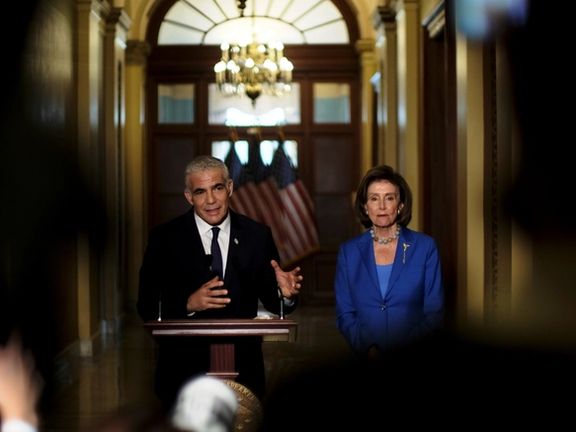
Israel’s Foreign Minister Yair Lapid met with US officials and members of Congress as part of a visit to Washington focused on Iran and its nuclear program.
Lapid’s office released a statement after his meeting with US National Security Advisor Jake Sullivan saying, “the foreign minister shared with the national security advisor Israel’s concerns about Iran’s race toward nuclear capabilities, as well as that Iran is becoming a nuclear threshold state.” The statement went on to stress that “Lapid also discussed with the national security advisor the need for an alternative plan to the nuclear agreement.”
In a separate readout, the spokesperson for the Biden administration’s National Security Council said “the officials also shared their perspectives on the threat posed by Iran. Mr. Sullivan reaffirmed President Biden’s commitment to ensuring that Iran never gets a nuclear weapon. The officials agreed that the United States and Israel will continue to consult closely on Iran and other critical matters impacting the security and stability of the region.”
Lapid also met with US Vice President Kamala Harris, Speaker of the House Nancy Pelosi, and other lawmakers. Harris noted Washington’s and Israel’s “shared concern” over Iran during her meeting with Lapid as well as the rights of Israelis and Palestinians to live in dignity. Lapid revealed that the focus of his visit was the Iranian nuclear program and the need for bipartisan support for Israel.
While in the United States, Lapid is also meeting with US Secretary of State Antony Blinken and will participate in a special trilateral meeting with Blinken and the UAE’s foreign minister, Sheikh Abdullah bin Zayed bin Sultan Al Nahyan on Wednesday.
The three parties will launch two new working groups, a senior State Department official said, as Washington hopes to expand the agreements between Israel and its neighbors known as the Abraham accords.
One working group will focus on religious coexistence and the other on water and energy issues, said the official, who briefed reporters ahead of the meeting on condition of anonymity, Reuters reported.
This visit comes as Israeli officials have become increasingly vocal in their impatience with the stalemate in nuclear negotiations with Iran. They have urged the Biden administration to prepare another package of sanctions as well as undertake military drills in the Middle East as a show of force to pressure Iran to return to the table. Jerusalem has also repeatedly emphasized the need to formulate a Plan B on Iran, should the nuclear negotiations with Tehran fail to salvage the nuclear deal from 2015.
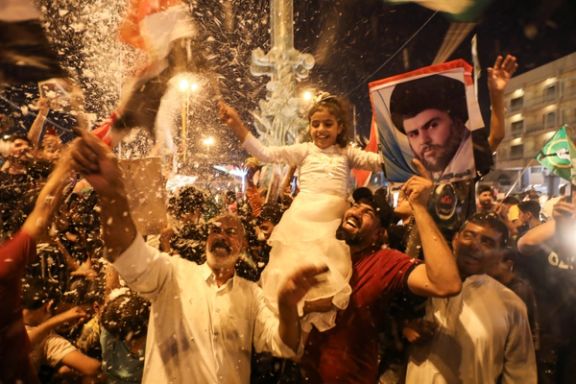
ANALYISIS - Iraqi voters delivered a sharp rebuke to Iran's allies in Sunday's election, but loosening their grip from control of the state will still be a politically delicate goal, with the threat of violence always in the background.
The main winner of the election was Shi'ite cleric Moqtada al-Sadr, a populist who has positioned himself as a staunch opponent of both Iran and the United States.
Sadr proclaimed the result a "victory by the people over ... militias". There was elation among his supporters.
"The most important thing in this election is that foreign countries like Iran didn't interfere in the vote," said Yousef Mohammed, an unemployed 21-year-old in Sadr's vast Baghdad stronghold of Sadr City. "We've been celebrating since last night."
Sadr's bloc, already the biggest in the 329-seat parliament, will expand to 73 seats from 54. Its main rivals for years, the Fatah bloc of factions linked to pro-Tehran militia, meanwhile, saw its parliamentary representation collapse -- to just 14 seats from 48.
An unusually unified Sunni Muslim bloc placed second, giving the minority sect perhaps its strongest leverage since the fall of Saddam Hussein. And even upstart groups of reformists who campaigned against the ruling elite managed to defy predictions that they would be outmaneuvered by established parties: a bloc headed by a pharmacologist emerged with ten seats.
Yet there are still signs that Tehran's grip on the country remains formidable. Most notably, former Prime Minister Nuri al-Maliki, a friend of Iran who campaigned as a champion of law and order, also won big surprise gains, emerging in third place with 37 seats.
A Western diplomat said the leader of Iran's Quds Force, Esmail Ghaani, was in Baghdad while the initial results were released, still seeking a way to keep Tehran's allies in power.
"According to our information, Ghaani was attending a meeting with (Shi’ite militia parties) yesterday. They will do whatever they can to try to organize the biggest bloc - although that will also be very difficult with Sadr's power," the Western diplomat said.
Tehran and Baghdad both publicly denied Ghaani was in Iraq, but two Iranian sources contacted by Reuters confirmed it.
At least one pro-Iran militia commander said the armed groups were prepared to resort to violence if necessary to ensure they do not lose their influence after what they view as a fraudulent election.
"We'll use legal frameworks for now. If unsuccessful we'll have to go to the streets and do the same thing that was done to us during protests - burn party buildings" of the Sadrists, he said.
PROXY BATTLEFIELD
Iraq has been a proxy battlefield for influence between the United States and Iran since the 2003 U.S.-led invasion, which toppled Saddam and created a path to power for a Shi'ite majority led by figures courted for decades by Tehran.
In 2014, when a third of Iraq was captured by fighters from the Sunni Muslim group Islamic State, Washington and Tehran found themselves uneasily on the same side: both providing assistance to Baghdad to fight the militants.
But when Islamic State was defeated in 2017, it was Iran that came out ahead. Factions linked to pro-Iran militias emerged with control over much of the Iraqi state.
That triggered a backlash in 2019, with hundreds of thousands of mainly young Iraqis taking to the streets to protest against corruption, joblessness and foreign influence. Security forces and the militia gunned down 600 of them. A prime minister close to Iran was forced to quit, paving the way for this week's early election.
Sadr, scion of a family of revered clerics including a father and uncle both murdered under Saddam, has emerged as a rare foe of both Washington and Tehran, first leading a Shi'ite uprising against U.S. occupation and later campaigning against Iranian influence.
While he has always held back from playing a leading role in governing coalitions, his followers have quietly secured control of ministries and industries in governments headed by other Shi'ite factions, most with ties to Tehran.
But most of Iraq's Shi'ite political establishment remains suspicious or even hostile to Sadr, including commanders of the security forces who battled his followers in the past. This may have helped Maliki, who as prime minister led a campaign more than a decade ago that successfully wrested southern cities and Baghdad districts from Sadr's followers.
Hamdi Malik, specialist on Iraq's Shi'ite militias at the Washington Institute, said Maliki had spent a lot of money campaigning and appealed to nostalgia among the armed forces, emphasising his own image as a strong leader.
One official from the Badr party, long one of the main pro-Iran factions, said one of the reasons for the poor showing of the militia's Fatah bloc was that supporters shifted their votes to Maliki, viewing him as a more effective bulwark against Sadr.
"Maliki already showed he can stand up to Sadr," the official said.
Analysis by John Davison and Ahmed Rasheed of Reuters